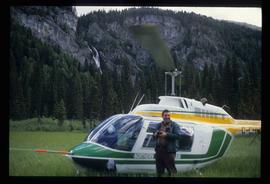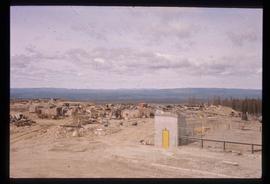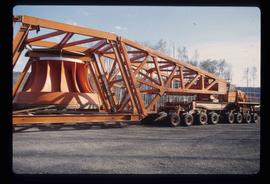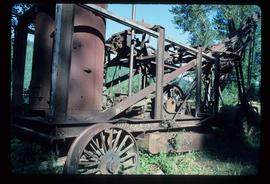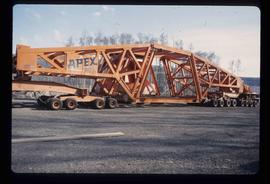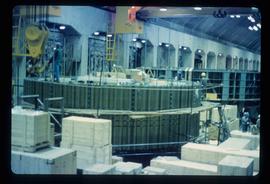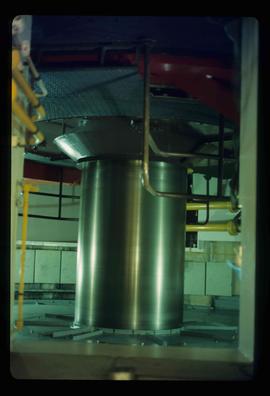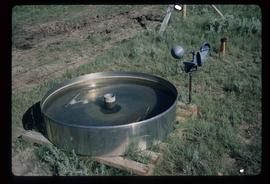File consists of printed webpages of research institutions, including libraries and archives, and contact information for individual researchers for Ainley's work on Australian indigenous knowledge.
Subseries consists of Dr. Ainley's work collecting oral histories as research materials for various research projects with a predominant focus on the experiences of women scientists. Files usually include interview transcripts, consent forms, any related correspondence, photocopied research materials, and notes.
File consists of research materials regarding Kathleen Gough Aberle. File includes handwritten notes, letters, drafts, interview transcripts, newspaper clipping, and photocopied research material.
File consists of research materials related to wives in science, including an interview with [Joan Hochbaum]. File also includes photocopied archival and secondary research materials and a pamphlet for a university symposium.
File consists of an article, by Ainley, hosted on Chinook Media's website, entitled, "Women and Science."
File consists of two articles: "Women Becoming Professional Scholars: Historians and Physicists" and "The Early History of Women in University Physics: A Toronto Case Study."
File consists of and handwritten notes and lists of female scientists, divided according to discipline and arranged into categories based on generation, with an indication of whether or not they had been interviewed.
File consists handwritten notes, a photocopy of a photograph of a surveyor sitting at his desk, an obituary for Alice Willard Turner, a draft chapter of the monograph from 1997 about women working in government institutions and correspondence.
File consists of correspondence with requests for archival material and information on the salaries of professors. File also contains notes on William Rowan's salary and correspondence on the salaries of professors at Victoria University (now part of the University of Toronto).
File consists of correspondence, notes, booklets, lists and research requests relating to the Chemical Institute of Canada, their archives and the Women's Committee of the Chemical Institute of Canada. File also contains articles on women in chemistry and the history of chemistry.
File consists of notes, rough drafts of chapters and sections of the monograph; research planning; and article lists.
File consists of notes on the progress and planning of research for the monograph and an analysis and organization of data.
File consists of sound recordings of oral history and research interviews by Ainley and others, conferences, symposia, radio programs, and a literary reading.
Item is an interview completed for a Canadian Studies 390/391 course at Simon Fraser University about the life and career of Margaret Benston.
Item is the first part of an interview discussing the career development of Helen Hogg as a scientist, including her early education. It was created as part of the University of Toronto Oral History Program.
Item is the first part of an interview in Fredericton, New Brunswick in which Marianne Ainley interviews Delphine Maclellan about the development of and perceived impediments to the development of her career
Item is the first part of an interview in which Marianne Ainley interviews Isabel K. Williamson about the development of and perceived impediments to the development of her career as well as the disciplinary culture of astronomy and the relationship between amateur and professional astronomers.
Item is an excerpt from a presentation on women in geology with a section of a group workshop discussion on problems related to fieldwork and how these problems can be reduced.
Item is an excerpt from a symposium on Kathleen Gough, at which Marianne Ainley presented a talk entitled on Kathleen Gough's career, that contains a short biography of Gough and some discussions about and presentations on the difficulties of Gough and other women in finding university employment
Item is the first part of an interview in which Marriane Ainley interviews Dolores Pushkar Gold, director for Centre for Research in Human Development at Concordia University, about her early life and the development of her career.
Item is the second part of an interview in which Marianne Ainley interviews Dolores Pushkar Gold, director for Centre for Research in Human Development at Concordia University, about her early life and the development of her career as well as her upcoming research.
Item is part of an interview with Carol Anne Robertson Mass, a physical chemist, in Toronto in which she discuss her early life and the development of her career in chemistry.
Item is an interview in which Marianne Ainley interviews Elvi Whittaker, a professor of anthropology at the University of British Columbia, about her early life and what influenced her to pursue a career in anthropology
Item is a reading by Rae M. Taylor with some music and a reading of several works and works-in-progress.
Item is an interview in Grimsby, Ontario with Helen McKenzie about her career progression and experience becoming an engineer.
Item is an interview in which Muriel Roscoe describes her early life and education as well as her appointment as an assistant professor at McGill University and her activities during her time at McGill University.
Item the second part of a presentation on the history of women in science, which includes a question and answer section.
Item is the first part of an interview with Dixie Pelleut, a former professor in biology at Dalhousie University, about her life and academic career as research for Fingard's monograph, "Gender and Inequality at Dalhousie: Faculty Women before 1950."
Item is an interview in which Mary Bryan describes her family, early life, education and professional career.
Item is an interview in which Magda Jones, founder of the Scientists' Wives' Association of the National Research Council, describes her family, early life, education and professional career.
Item is an interview in which Phyllis Atkinson, a chemist and detonation tester during World War II, describes her family, early life, education and professional career.
Item is an interview in which Helen Hogg, an astronomer, describes her family, early life, education and professional career.
Item consists of recordings of music by Saami people.
Item is a presentation of research about the transfer of Aboriginal knowledge to early female scientists for Ainley's Social Science and Research Humanities Council (SSHRC) project, "Re-explorations: Gender, Science and Environment in the 19th and 20th Century Canada and Australia."
Item is a profile of Dr. William Rowan, a former zoology professor at the University of Alberta.
File consists of handwritten notes on lined paper and cue cards as well as photocopied research materials and newspaper on Canadian universities.
File consists photos of birds, flowers, travel photos, and some research materials.
Image depicts a man standing in front of a helicopter; a waterfall is visible on the cliffs in the background. The slide itself is labelled "BC Parks Tour."
Image depicts what appears to be a junkyard for old mining equipment at an uncertain location, though possibly near Gibraltar.
Image depicts a turbine on the back of an industrial vehicle, located somewhere in Fort St. John, B.C.
Image depicts a large, old piece of machinery, possibly some form of mining or prospecting equipment; it is located in Quesnelle Forks, B.C.
Image depicts a turbine on a large industrial vehicle somewhere in or near Fort St. John, B.C.
Image depicts numerous wood crates and large pieces of machinery in an unknown concrete structure, possibly somewhere in Fort St. John, B.C.
Image depicts a piece of machinery shaped like a large metal cylinder. It is possibly located somewhere in Fort St. John, B.C.
Image depicts an evaporation pan for water evaporation measurements. The location is uncertain.
File contains slides depicting weather balloons.
File consists of records relating to the Arocena's application and offer of employment at UNBC as Assistant Professor in the Faculty of Natural Resources and Environmental Studies. His start date at UNBC was 1 July 1994.
File consists of Dr. Joselito Arocena's promotion package for rising to the rank of full professor at UNBC.
File consists of a research proposal to the TriCouncil Secretariat entitled "Ecosystem and Community Health of the Nat'oot'en First Nation - Co-Management Alternatives for the Babine Lake Watershed". The principal investigator for the proposal was Darwyn Coxson. Dr. Joselito Arocena was a named co-investigator, along with many others.
File consists of a final draft of the "Blueberry Nation Health Study" prepared by the UNBC Environmental Health Research Group in 1997.
